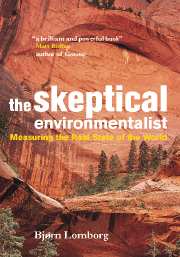Book contents
- Frontmatter
- Contents
- List of figures
- List of tables
- Preface
- Language and measures
- Acknowledgements
- Permissions
- Part I The Litany
- Part II Human welfare
- Part III Can human prosperity continue?
- 8 Are we living on borrowed time?
- 9 Will we have enough food?
- 10 Forests – are we losing them?
- 11 Energy
- 12 Non-energy resources
- 13 Water
- 14 Conclusion to Part III: continued prosperity
- Part IV Pollution: does it undercut human prosperity?
- Part V Tomorrow's problems
- Part VI The Real State of the World
- Notes
- Bibliography
- Index
12 - Non-energy resources
Published online by Cambridge University Press: 05 March 2013
- Frontmatter
- Contents
- List of figures
- List of tables
- Preface
- Language and measures
- Acknowledgements
- Permissions
- Part I The Litany
- Part II Human welfare
- Part III Can human prosperity continue?
- 8 Are we living on borrowed time?
- 9 Will we have enough food?
- 10 Forests – are we losing them?
- 11 Energy
- 12 Non-energy resources
- 13 Water
- 14 Conclusion to Part III: continued prosperity
- Part IV Pollution: does it undercut human prosperity?
- Part V Tomorrow's problems
- Part VI The Real State of the World
- Notes
- Bibliography
- Index
Summary
The concern about running out of resources applies not only to energy but also to the vast number of other non-renewable resources that we use today. And the arguments are eerily similar to the arguments in the chapter on energy.
Actually, we have always worried about running out of resources. In antiquity grave concerns were voiced about running out of copper and tin. And the best-seller Limits to Growth from 1972 picked up on the old worry, claiming that we would run out of most resources. Gold would run out in 1981, silver and mercury in 1985, and zinc in 1990. But, of course, this hasn't happened yet.
The pessimists bet on resources running out – and lost
Although economists have long acknowledged that the fear of running out of resources is erroneous, it had an almost magical grip on intellectuals in the 1970s and 1980s. Even today most discussions seem to be played out against a backdrop of arguments pointing back to the logic of Limits to Growth.
Frustrated with the incessant claims that the Earth would run out of oil, food and raw materials, the economist Julian Simon in 1980 challenged the established beliefs with a bet. He offered to bet $10,000 that any given raw material – to be picked by his opponents – would have dropped in price at least one year later.
- Type
- Chapter
- Information
- The Skeptical EnvironmentalistMeasuring the Real State of the World, pp. 137 - 148Publisher: Cambridge University PressPrint publication year: 2001



